
Early Career Research Awards
Early Career Research Awards recognise the impact of research carried out in the molecular biosciences by early career scientists.
It is expected that successful candidates will have produced international quality research outputs, and be able to demonstrate ambitions and aspirations consistent with the potential to achieve world-leading status.
Candidates can include senior postdoctoral research fellows or researchers starting their first independent post and have limited funding.
Nominations for the 2027 Awards are now closed
Please keep an eye on our website and social media channels in April 2026 when the winners will be announced!
The recipient is given:
- A grant to attend a relevant event or training course
- A medal
- The opportunity to present a lecture at a Society event or webinar
- An invitation to submit an article to one of our journals, with any fees waived
Eligibility criteria:
- Awarded for the impact of research carried out in the molecular biosciences
- Nominees should be in the early stages of their career, typically within 6 years of receiving their highest qualification. Potential nominees can include senior postdoctoral research fellows or researchers starting their first independent post and have limited funding
- Nominees should have produced international quality research outputs
- Nominees should be able to demonstrate ambitions and aspirations consistent with the potential to achieve world-leading status
- Open to nominees based in the UK or internationally
- This award is only open to individuals
Please note that career breaks are taken into consideration for the Early Career Research Awards. A career break is considered as any period of time where the candidate is out of work, for reasons including, but not limited to, redundancy, maternity leave, paternity leave, shared parental leave or adoption leave, extended leave to perform a carer role, long-term illness, disruptions caused by the Covid-19 pandemic, and/or as a consequence of relocation. If the candidate has taken a career break for maternity leave or shared parental leave, eligibility for the Early Career Research Awards will be extended by 12 months per child.
If you have any queries regarding the eligibility criteria for an award, please contact the Awards Team.
The Awards Committee will consider the following aspects of all nominations for the Early Career Research Awards as appropriate:
- Originality of research
- Impact of research
- Quality of outputs – publications and/or patents and/or software
- Quality of international research outputs
- Collaborations and teamwork
- Independence and/or ambitions
- Commitment to build, support, and nurture future talent e.g., public engagement or outreach
- Other indicators of esteem demonstrated by the nominator

Upcoming Award Lectures
Nicholas Riley will present his Award Lecture at the 95th Harden Conference: Linking Golgi trafficking and glycan function from 23-26 June 2026.
Register now!Contact us
For further information please get in touch with the Awards department.
Related content
5 itemsRecipients
Georgia Atkin-Smith
Georgia Atkin-Smith

One of the Early Career Research Awards for 2026 will be presented to Dr Georgia Atkin-Smith. Georgia is a Senior Postdoc and NHMRC Research Fellow at the Walter and Eliza Hall Institute of Medical Research. She is mentored by Associate Professor Edwin Hawkins, Professor Andreas Strasser and Professor Gemma Kelly. Georgia completed her PhD in 2019 at La Trobe University, receiving the Nancy Millis Medal for the top 5% of PhD theses. During her postdoctoral tenure, Georgia secured multiple highly competitive research grants, including an NHMRC Investigator Grant, a L’Oreal UNESCO For Women In Science Fellowship and multiple philanthropic grants. Her research combines a variety of high-resolution imaging techniques to study cell death, efferocytosis and cancer. Specifically, Georgia specialises in intravital microscopy which provides an unparalleled approach to track the development and treatment of blood cancers in vivo. Her exciting research program has resulted in multiple high impact first author publications such as in Nature Communications (x2), Communications Biology, Cell Reports and more. She is the President and Founder of the Australasian Cell Death Society and Editor at Cell Death and Disease. Also known as Some Blonde Scientist, Georgia is a passionate science communicator, Keynote speaker and advocate of women in STEM.
Georgia said: “I am extremely thankful to the Biochemistry Society for this incredible honour. This recognition will assist me in establishing my independent research team and with it, generate new knowledge into the development of blood cancer in vivo. I hope this can be celebrated by all new mums who are striving to find the balance between their careers and parenthood – success comes only through the combination of support and sacrifice.”
Nicholas M. Riley
Nicholas M. Riley

One of the Early Career Research Awards for 2026 will be presented to Dr Nicholas M. Riley. Nick is originally from Louisville, KY and earned his B.S. in Chemistry from the University of South Carolina. He then moved to Madison, WI for his graduate studies with Professor Josh Coon at UW-Madison, where he worked on mass spectrometry instrumentation and proteomics methodology. He focused on methods involving electron transfer dissociation, which introduced him to glycoproteomics. His newfound interest in glycoproteins led him to a postdoc with Professor Carolyn Bertozzi at Stanford University, where he worked on new chemical biology, mass spec, and informatic tools to characterise mucin-domain glycoproteins and cell-type specific secretomes. Since starting in Seattle in fall 2023, his group uses state-of-the-art mass spectrometry and chemical glycobiology to develop innovative technologies to investigate glycoproteome regulation. Specifically, his group is interested in understanding how altered cell surface phenotypes (i.e., glycocalyx status) manifest in cancer progression and drive metastasis.
Nick said: "I am honoured to join a distinguished group of Biochemical Society awardees! I am most excited for how this opportunity can further my group's collaborative research. There are so many contexts where glycobiology drives interesting biochemistry, and I hope this can be an exciting moment to highlight the bioanalytical methods our group has developed so that we can connect with others to keep expanding our scope of understanding of how glycoconjugates affect cell surface biology.”
Eduardo Fuentes-Lemus
Eduardo Fuentes-Lemus
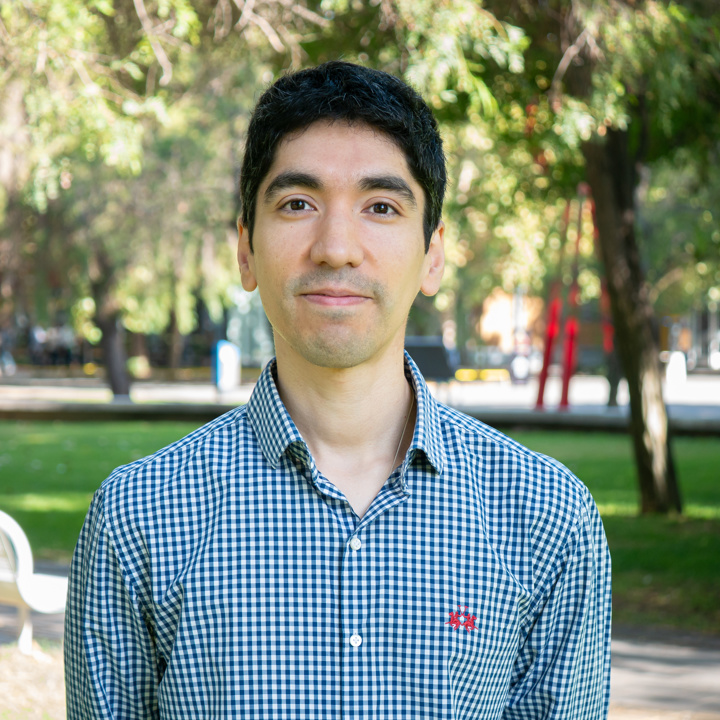
One of the Early Career Research Awards for 2026 will be presented to Dr Eduardo Fuentes-Lemus. Eduardo received his PhD in Chemistry in 2018 from the Pontifical Catholic University of Chile. Then, after a one-year postdoc at the University of Santiago (Chile), he moved to Denmark in 2020 to continue his academic career as a postdoc at the Department of Biomedical Sciences (University of Copenhagen) after receiving an Individual Fellowship under the programme Horizon 2020 (European Commission, Marie Skłodowska-Curie Actions). Since July 2024 he holds a tenure-track Assistant Professorship position at the Pontifical Catholic University of Chile, and continues as a Guest Researcher at University of Copenhagen. His current research interests include understanding different physico-chemical aspects that modulate protein modification (primarily oxidative modifications), particularly, the effect that biological interfaces, macromolecular crowding and microdomains would have on the pathways and kinetics of protein oxidation and aggregation.
Eduardo said: “I was coming back to the office from my teaching duties at the University when I learned that I have been awarded the Early Career Research Award. I was absolutely delighted and felt extremely fortunate - The list of previous winners is very impressive! The first person that came to my mind (after my wife of course) was Prof. Michael J. Davies to whom I am extremely grateful. He has been an inspirational mentor throughout my career showing me the path to a meaningful scientific/academic career. I am also grateful to Prof. Radi and Prof. Hawkins who supported my nomination and are also inspiring researchers. Finally, I would like to thank the colleagues and students I had while working at the Protein Oxidation group (BMI, UCPH), as well as, all my other colleagues working at various international institutions. Receiving this recognition is really humbling and reinforces my commitment to continuing performing research at the highest level. Hopefully, this will boost my career opening new funding opportunities for my newly established group at the Pontifical Catholic University of Chile”.
Juan Carlos De La Concepción
Juan Carlos De La Concepción
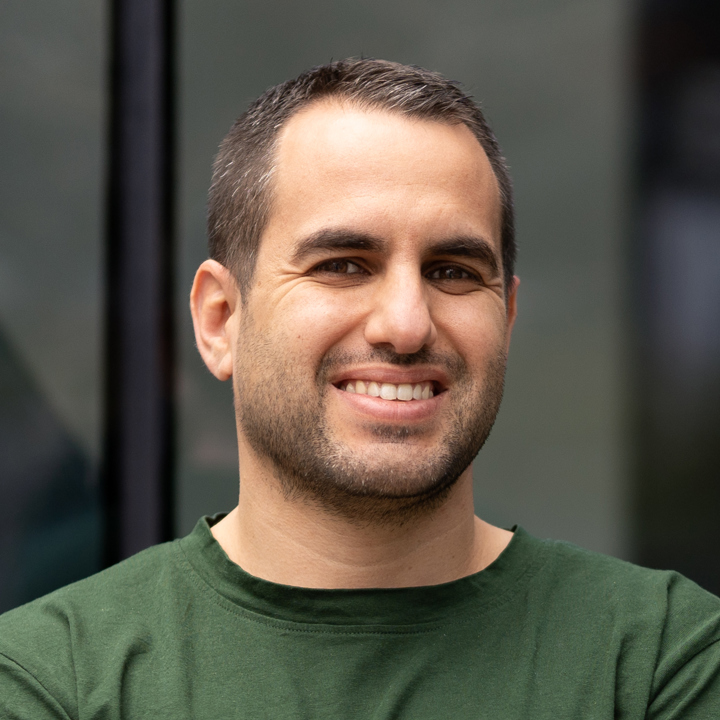
One of the Early Career Research Awards for 2026 will be presented to Dr Juan Carlos De La Concepción. Juan is from a city near Sevilla, Andalucia, where he completed his bachelors in Biology and Biochemistry and later on a Masters in Molecular Genetics. After numerous internships abroad, Juan was lucky to join the Rotation PhD in Plant and Microbial Sciences at The John Innes Centre and The Sainsbury Laboratory in Norwich. There, he worked in unravelling the structural basis of how the plant immune system recognise fungal pathogens. Juan’s work, in collaboration with colleagues in UK and Japan, advanced the understanding of plant immunity and led to the engineering of novel plant immune receptors for improved disease resistance in crops.
After his PhD, he moved to the Gregor Mendel Institute in Vienna where he changed research field and extended his skillset to investigate the biochemical basis of evolution in a conserved eukaryotic protein complex. While doing his postdoc, Juan acquired experience in Cryo-EM and Cryo-ET with the aim of applying these technologies to investigate the cellular changes underpinning the biology of plants and pathogens.
Juan said: “It is an honour to receive this recognition from the Biochemical Society. Looking at the list of great scientists previously awarded, it feels incredibly humbling and motivating to be listed among them.”
Photo credit: Adam Cooper
Juan presented his Award Lecture at Plant Proteins: functions, regulation, production and utility between 21-23 October 2025.
Tatsuya Nobori
Tatsuya Nobori

One of the Early Career Research Awards for 2025 will be presented to Dr Tatsuya Nobori. Tatsuya is originally from Japan. He completed his bachelor’s and master’s degrees at The University of Tokyo. He completed his Ph.D. (summa cum laude) in 2019 in the group of Kenichi Tsuda at the Max Planck Institute for Plant Breeding Research in Cologne, Germany, where he established methods to analyze bacterial transcriptomes and proteomes in planta. His studies revealed how plants influence the responses of pathogens and microbiota. He then joined the lab of Joe Ecker at the Salk Institute in San Diego, California, as a Human Frontiers Science Program Long-term fellow. His research integrates single-cell multiomics and spatial transcriptomics to study heterogeneity in plant-microbe interactions. He also developed a new method called PHYTOMap, which enables multiplexed spatial gene expression analysis in 3D in whole-mount plant tissues. In the summer of 2024, he is set to establish a new lab at The Sainsbury Laboratory (TSL) in Norwich, UK. His new lab aims to understand molecular and spatiotemporal characteristics of cells comprising the holobiont (the collective entity of the host and surrounding microbes) by developing and incorporating new genomics and imaging technologies tailored for studying plant-microbe interactions.
Tatsuya said: "I am truly honoured and humbled to receive this award, a recognition only made possible through the constant support from my mentors, Prof. Kenichi Tsuda and Prof. Joe Ecker, my colleagues, and the collaborators with whom I've had the privilege of working. I am also grateful to Dr. Mike Deeks and Prof. Nick Talbot for their support in my nomination."
Tatsuya presented his Award Lecture at Plant Proteins: functions, regulation, production and utility between 21-23 October 2025.
Shey Robert Adamu
Shey Robert Adamu

One of the 2025 Early Career Research Awards will be presented to Dr Shey Robert Adamu. Robert is an early-career researcher at the University of Buea in Cameroon where he teaches and carries out research on the use of computational tools for the rational design and development of diagnostics and vaccines for infectious diseases. He holds a Ph.D. in Molecular Biology from the Université Libre de Bruxelles in Belgium, where he also completed a two-year postdoctoral fellowship. In 2020, Dr Shey was awarded the WHO/TDR Clinical Research and Development Fellowship and underwent one-year training focused on research-related project management at the European Vaccine Initiative in Germany. He is currently an EDCTP-CANTAM Career Development Fellowship recipient and his project is focused on the development of novel diagnostic tools for onchocerciasis. In addition, he is the principal investigator of two projects funded by the Integrated Services for Infectious Disease Outbreak Research (ISIDORe); one focused on the development of diagnostic tools for monkeypox serosurveillance and the other on the development of transmission-blocking vaccines for Aedes-borne virus using mosquito salivary gland proteins. He is passionate about capacity building, academic mentoring, and research development, especially in Africa.
Robert said: "I am extremely thrilled and thankful to be a recipient of this award from the Biochemical Society. A popular African proverb says, “It takes a village to raise a child”. This award is a display of the greatly brilliant people I have been privileged to work with, especially those who supervised, mentored, and supported me. I am grateful to my supervisors and mentors, especially, Prof. Stephen Ghogomu, Prof. Jacob Souopgui, and Prof. Luc Vanhamme for providing their shoulders for me to stand on. I am looking forward to the many benefits that this award affords me, especially the mentorship. I am also looking forward to contributing to the mission of the Biochemical Society as well as creating new networks."
Robert presented his Award Lecture 'Immunoinformatics: The Key to Developing Diagnostics and Vaccines for Onchocerciasis' as part of the Biochemistry Focus webinar series. View the recording.
Pau Castel
Pau Castel

One of the 2025 Early Career Research Awards will be presented to Dr Pau Castel. Pau is an Assistant Professor within the Department of Biochemistry and Molecular Pharmacology at NYU Grossman School of Medicine. He completed his graduate studies at Memorial Sloan Kettering Cancer Center, under the mentorship of Dr José Baselga, where he focused on elucidating the mechanisms of action and resistance associated with targeted therapies, particularly PI3K inhibitors, approved for treating metastatic breast cancer. Subsequently, Dr Castel pursued postdoctoral research at the University of California San Francisco, working in the laboratory of Dr Frank McCormick. There, he focused into the biochemical mechanisms governing signal transduction within the RAS/MAPK pathway, providing valuable insights into fundamental cellular processes critical for cancer development. Currently, Dr Castel's research is directed towards understanding the molecular mechanisms of oncoprotein transformation in both cancer and congenital disorders. Leveraging a multidisciplinary approach encompassing biochemical techniques, signal transduction, and mouse genetics, his laboratory strives to elucidate the complexities of the RAS/MAPK pathway. Ultimately, the overarching goal of his work is to pioneer rational-based therapeutic strategies tailored for the treatment of these disorders. Dr Castel's research has been published in several international peer-reviewed journals and has received support from the US National Institute of Health and the Department of Defense.
Pau said: “I am honored to be recognized by the Biochemical Society, a historical institution in our field. This award not only signifies an acknowledgement to my previous work, but also serves as a motivation for my lab’s future research.”
Pau presented his Award Lecture at Small G proteins in cellular signalling and disease between 25-27 June 2025.
Mattie Pawlowic
One of the 2024 Early Career Research Awards will be presented to Dr Mattie Pawlowic. Mattie earned her undergraduate degree and PhD from Texas Tech University working in the laboratory of Kai Zhang. She then joined Boris Striepen's lab, then at the University of Georgia, for her postdoctoral work. She was a part of a team that developed CRISPR for Cryptosporidium. Cryptosporidium is a protozoa that is a leading cause of diarrehal disease in malnourished children. There is no vaccine, no effective treatment, and very little of the basic biology is understood. In 2017 Dr. Pawlowic joined the University of Dundee as a PI and Sir Henry Dale Fellow. Her group studies how Cryptosporidium parasites are transmitted using genetic and biochemical approaches. The lab also collaborates with drug discovery scientists to advance emerging therapeutics. Dr. Pawlowic also co-founded SPPIRIT, a network to connect parasitology researchers across Scotland and support career development for ECRs.
On winning the Early Career Research Award for 2024, Mattie said: "I am really honoured and thrilled to receive this award. I would like to thank the group at Dundee who nominated me for this award, my lab for their hard work, and my collaborators for their support of my growing group. This award will allow me to attend a Biochemical Society meeting and share our group's work, as well as be mentored by an Associate Editor. These experiences will greatly support myself and my lab group."
Mattie presented her Award lecture at Key Aspects of Modern Drug Discovery on 5 November 2024.
Benjamin Schumann
One of the 2024 Early Career Research Awards will be presented to Dr Benjamin Schumann. Ben studied Biochemistry at the University of Tübingen. Interested in chemical tools to further biology, he performed his doctoral work in carbohydrate chemistry with Peter H. Seeberger at the Max Planck Institute Potsdam and the FU Berlin. He developed vaccines against pathogenic bacteria based on synthetic glycans, learning to apply his compounds in vivo and in vitro and receiving the Award for Excellence in Glycosciences as well as the Otto Hahn Medal by the Max Planck Society.
During his postdoctoral work in the lab of Carolyn R. Bertozzi at Stanford University as an Alexander von Humboldt Foundation fellow, Ben developed an interest for bioorthogonal tools to study glycosylation of human cells in great detail. He started as a Group Leader at the Francis Crick Institute and Imperial College London in 2018 to develop so-called chemical “precision tools” to investigate individual glycosyltransferase enzymes, using a combination of chemoenzymatic synthesis, molecular cell biology and glycoproteomics. The lab was part of a large international team that received the 2021 Rita and John Cornforth RSC Horizon Prize in Chemical Biology. Ben is an EMBO Young Investigator and received an ERC Starting Grant in 2023, now covered by the UKRI Guarantee scheme.
On winning the Early Career Research Award in 2024, Ben said: "I am extremely grateful to be receiving this award which is a testament to my group’s hard work. The Biochemical Society provides an outstanding platform to forge connections, allowing us to establish our chemical “precision tools” in modern quantitative biology."
Ben presented his Award lecture at Advances and New Horizons in Glycobiology on 4 December 2024.
Amy Vincent
Amy Vincent

One of two 2023 Early Career Research Awards was presented to Dr Amy Vincent. Amy is a Sir Henry Wellcome Postdoctoral Fellow at the Wellcome Centre for Mitochondrial Research (Newcastle, UK). Her work focuses on studying the pathological mechanisms underlying mitochondrial myopathy and disease progression. Her recent work investigates the contributions of mitochondrial DNA replication, mito-nuclear signalling and cell and mitochondrial morphology to the clonal expansion of mitochondrial DNA deletions and the spread of mitochondrial DNA mutations and dysfunction through muscle fibres.
Amy says: “I am delighted to be recognised with this award and incredibly grateful to Prof Chrzanowska-Lightowlers for nominating me. This award is very much a reflection of the highly talented people I have the pleasure of working and collaborating with and those who have and continue to support me. I would particularly like to thank Prof Sir Doug Turnbull who has been an inspiration, exceptional supervisor and mentor.”
Amy presented her Award Lecture at Mitochondrial Dysfunction and Neurodegeneration on 20 April 2023.
Read Amy's article published in the Biochemical Journal - Interactions of mitochondrial and skeletal muscle biology in mitochondrial myopathy
Tom Deegan
Tom Deegan

One of two 2023 Early Career Research Awards will be presented to Dr Tom Deegan. Tom has been a Programme Leader at the MRC Human Genetics Unit in Edinburgh since September 2021. Prior to this, Tom undertook his PhD with John Diffley (The Francis Crick Institute, London) and postdoctoral work as a Sir Henry Wellcome postdoctoral fellow with Karim Labib (University of Dundee).
Throughout this time, Tom’s research has focussed on the fundamental molecular mechanisms that eukaryotic cells use to replicate their DNA prior to cell division. In recent years, Tom has harnessed innovative biochemical and structural biology approaches to unpick the ill-defined ‘termination’ stage of this fundamental biological process.
Tom says: “I am absolutely delighted to have won this award. The list of previous winners is very impressive; I’m honoured to join them, and I hope this will be a springboard for starting my group at the MRC Human Genetics Unit. I would like to thank all the people who supported my nomination, particularly Drs. John Diffley and Karim Labib, who have been fantastic mentors to me, as well as all the brilliant scientists that I have had the pleasure to work alongside over the years.”
Tom presented his Award lecture at the UK DNA Replication meeting in September 2022.
Maria Marti Solano
Maria Marti Solano

The 2022 Early Career Research Award was presented to Dr Maria Marti Solano. Maria is a FEBS Long Term and Marie Skłodowska-Curie postdoctoral fellow at the MRC Laboratory of Molecular Biology. Her research focuses on the study of the relationships between structure, signalling, and phenotype that underlie receptor function. In her most recent work, Maria has integrated data on multi-omics, receptor sequence and structure, and molecular pharmacology to analyse how G protein-coupled receptor isoform structural and functional variation across human tissues can contribute to system-specific receptor signalling in response to endogenous ligands and drugs.
Maria said: “I am delighted to receive this award. I would like to thank my nominators, especially Dr M. Madan Babu, who is not only a really inspiring scientist but also an excellent mentor. Due to its multi-disciplinary nature, my research would not have been possible without the outstanding experimental and computational collaborators I’ve been lucky to work with in the past years, so I’d like to take this chance to thank them all for their continued support.”
Maria presented her Award lecture at the Small G proteins meeting in September 2022.
Read Marti's article published in Biochemical Society Transactions - A multi-dimensional view of context-dependent G protein-coupled receptor function
Hendrik Messal
Hendrik Messal

The 2022 Early Career Research Award was presented to Dr Hendrik Messal. Dr Messal completed his PhD in 2017 in the lab of Axel Behrens at the Francis Crick Institute London. He is currently a postdoc with Jacco van Rheenen at the Netherlands Cancer Institute in Amsterdam, where he uses 3D whole organ microscopy to explore the molecular mechanisms that shape tissue morphology in the normal and cancerous breast and pancreas.
Hendrik said: “I am delighted to be the recipient of the Biochemical Society’s Early Career Research Award. I thank my nominators and mentors for their continuous support. Above all, this award honours the many outstanding minds I have had the pleasure working with along the years."
Hendrik presented his Award Lecture at Dynamic Cell V on 18 April 2023.
Kirsty Wan
Kirsty Wan

The 2021 Early Career Research Award was presented to Dr Kirsty Wan at the University of Exeter, UK. Kirsty is a Senior Research Fellow and group leader at the Living Systems Institute (LSI), University of Exeter. Her main research interests concern the motile behaviour and dynamics of microorganisms, with emphasis on exploring novel interdisciplinary approaches. She obtained her undergraduate (mathematics) and PhD degrees (biological physics) from the University of Cambridge, UK, where she was also awarded a Nevile Research Fellowship from Magdalene College (2014-2017) for her postdoctoral work. In 2019, Kirsty was the recipient of an ERC Starting Grant to begin a major new project on single-cell cognition.
On receiving the Early Career Research Award, Kirsty said: “I am absolutely delighted with this news! It is a real pleasure to have been given this award from the Biochemical Society. This is further justification for the value of interdisciplinary research – something that was instilled in me early on by my mentors. I take this opportunity to thank my PhD (and postdoc!) supervisor Professor Ray Goldstein who has been a constant source of inspiration throughout my career. I am also extremely grateful to my colleagues at Exeter for making and shaping the LSI and cultivating a unique and stimulating working environment. I look forward to the many scientific discoveries that we will continue to make together."
Kirsty presented her Award lecture at the Online ‘Dynamic Cell IV’ conference on 14-19 March 2021.
Roser Vento-Tormo
Roser Vento-Tormo

The 2021 Early Career Research Award will be presented to Dr Roser Vento-Tormo at the Wellcome Sanger Institute, Cambridge, UK. She completed her postdoctoral studies under the supervision of Professor Sarah Teichmann as an EMBO and HFSP fellow. Here she developed CellPhoneDB, a unique resource of ligands, receptors and their interactions, integrated with a statistical framework to build cellular communication networks from single-cell transcriptomics data. Roser has used this cutting-edge computational framework to study maternal-fetal communication during early pregnancy in humans. More broadly, CellPhoneDB has also been key to identifying cell-cell interactions mediating fundamental biological processes including hematopoiesis and the tumour microenvironment.
Roser Vento-Tormo presented her award lecture ‘Mapping development and regeneration in vivo and in vitro’ as part of the Biochemistry Focus webinar series. View the recording.
On winning the Early Career Research Award, Roser said: “I am thrilled to receive the Early Career Research Award by the Biochemical Society, which recognises the work of my superb team and collaborators. Together, we combine computational and experimental expertise to define novel cell identities, their regulation and functional role in health and disease. I would also like to take this opportunity to thank my nominators and mentors for their support during the early stages of my career as an independent investigator.”
Andrew Hammond
Andrew Hammond

One of the two 2020 Early Career Research Awards was presented to Andrew Hammond of Imperial College London, UK.
Andrew completed his PhD at Imperial College London working on gene drives. Gene drives have incredible potential to modify entire populations of the malaria mosquito by biasing their own inheritance. Andrew’s PhD was focused upon finding suitable targets in the mosquito genome, and establishing CRISPR technologies in the mosquito to test its potential as a gene drive. Andrew’s primary PhD research demonstrated the first gene drive system designed to suppress populations of the malaria mosquito, including the first use of CRISPR in the African malaria mosquito. Andrew found that in caged release experiments, these gene drives spread, but were soon forced out of the population as a result of evolved resistant mutations. Andrew then focused on targeting sites in the genome that might be unable to tolerate the types of mutations that had previously been shown to confer resistance, identifying an extremely conserved site in the a region of the doublesex gene that is required for female development and built a gene drive designed to target this. By building in additional improvements to the drive design, it was able to spread very quickly through caged populations, without selecting for resistance, and ultimately eliminating the entire mosquito populations. Alongside this research, Andrew also co-developed the first CRISPR-based system to bias the sex ratio – a key process needed to develop several strategies for pest and vector control. Andrew has recently been awarded a Sir Henry Wellcome Fellowship to initiate a new line of research aimed at understanding the neurobiology underlying mosquito attraction to humans. This work will be undertaken at John’s Hopkins University, Imperial College London, and the University of Oxford.
Andrew said: “I cannot express how delighted I am to be awarded the Early Career Research Award from the Biochemical Society! I have been incredibly fortunate to have been based in such a fantastic lab over the past 7 years, with brilliant colleagues such as Dr Roberto Galizi and Kyros Kyrou. I must thank Professor Austin Burt who has been an inspirational mentor throughout my career and whose theory of gene drive first attracted me to the research. The two people I am most grateful to are my PhD supervisors, Dr Tony Nolan and Professor Andrea Crisanti – who have showered me with abundant motivation, advice and support throughout my PhD and post-doctoral research.”
On 11 June 2020, Dr Andrew Hammond, one of the Biochemical Society's Early Career Research Awards recipients, presented his work on 'Building gene drives to beat malaria' as part of the Biochemistry Focus webinar series. View the recording
Sara Priego Moreno
Sara Priego Moreno

One of the two 2020 Early Career Research Awards will be presented to Dr Sara Priego Moreno of the Salk Institute for Biological Studies, USA.
Sara’s research has focused on understanding the molecular mechanisms that govern the poorly characterized termination stage of eukaryotic DNA replication. Using egg extracts from the African clawed frog Xenopus laevis to run in vitro DNA replication reactions, Sara was able to characterize for the first time the biochemistry underlying one of the most important events taking place during replication termination: Replisome disassembly upon replication forks convergence. Sara discovered that ubiquitylation of the replisomes by the ubiquitin ligase Cullin2LRR1 during termination of replication forks and further processing by the segregase p97 drove the extraction of the replisomes from the DNA. These discoveries had a very strong impact in the replication and genome instability fields as they have unveiled fundamental molecular mechanisms and improved understanding of the termination stage of DNA replication. After completing her PhD and a six month postdoctoral position at the University of Birmingham, Sara joined the Salk Institute for Biological Studies in California, USA. Sara’s research is now focused on the understanding of replication mechanisms required for the maintenance of the essential telomeric DNA in human primary and cancer cells.
Sara said: “I was absolutely delighted and extremely happy when I found out that I was a recipient for The Early Career Research Award 2020 of the Biochemical Society. I want to give a big thanks to my wonderful PhD supervisor, Dr Aga Gambus, for her constant support throughout my PhD project and for always transmitting her enthusiasm and passion for science. I also want to thank my great colleagues, for the time and effort they spent towards my project and for making the lab a very friendly, exciting and fun place to work every day. I may be the one wining this award but this would not be possible without their help.”
Sara presented her Award lecture on Thursday 16 July 2020 as part of the Biochemistry Focus webinar series. View the recording.
Read Sara's article published in Biochemical Society Transactions - Mechanisms of eukaryotic replisome disassembly
Michael Booth
Michael Booth
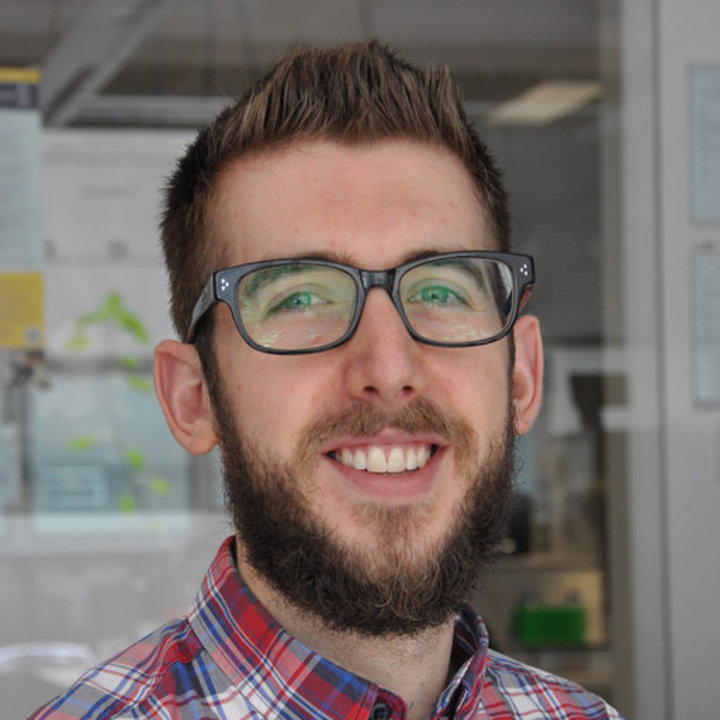
The 2019 Early Career Research Award for Biotechnology was awarded to Michael Booth from the University of Oxford, UK. Michael developed novel DNA sequencing techniques for the detection of two newly discovered modified DNA bases. These newly discovered modified bases had been implicated in human development and disease progression; however, there were no sequencing techniques to precisely map them in the genome to uncover their functional relevance. Furthermore, these sequencing techniques have been patented and spun-out into a company, Cambridge Epigenetix. Cambridge Epigenetix now markets the technique as a kit under the name ‘TrueMethyl®’. Michael currently based in the group of Hagan Bayley as a postdoctoral researcher, and was awarded a Junior Research Fellowship at Merton College Oxford, held from 2014-2017. Here Michael synthesised light-activated DNA and demonstrated its use to stringently control protein expression in synthetic tissues. These synthetic tissues act as functional mimics of neuronal transmission that can be controlled in a precise way.
Of winning the Early Career Research Award for Biotechnology, Michael said: “I was absolutely delighted to find out I have been awarded the Early Career Research Award in Biotechnology by the Biochemical Society. I would very much like to thank two important mentors from my research career, Sir Shankar Balasubramanian and Hagan Bayley, and their respective research groups.”
Michael presented his award lecture at the Biochemical Society conference ‘Synthetic Biology UK 2019‘ on 9-10 December 2019 at University of Warwick, UK.
Ana Casañal
Ana Casañal

The 2019 Early Career Research Award for Genes was presented to Ana Casañal from the MRC Laboratory of Molecular Biology, University of Cambridge, UK. Ana has been working on the determination of the structure and function of the cleavage and polyadenylation factor (CPF) from yeast. In eukaryotes, mRNA 3′-end processing is a key step in gene expression regulation that involves both cleavage and polyadenylation of the nascent RNA transcripts. CPF is 1 MDa complex that cleaves the nascent mRNA, adds a poly(A) tail and dephosphorylates RNA polymerase II to coordinate transcription. mRNA polyadenylation is deregulated in human diseases and is hijacked by viruses. Therefore it is critical to understand how the mRNA 3’-end processing machinery functions and how its activity can be regulated. Ana’s research provided a breakthrough towards the understanding of 3’-end processing showing a new architecture of CPF and the first cryo-EM structure of its poly(A) polymerase module. Ana’s work provides detailed insight into polyadenylation, and also has broad relevance in gene expression, RNA biology, and multi-protein assemblies.
Of winning the Early Career Research Award for Genes, Ana said: ”I am delighted and honoured to have been selected for the Early Career Research award of the Biochemical Society. This would not have been possible without the support from my PhD and postdoc supervisors, Prof. Valpuesta, Dr. J. A. Marquez and Dr. Lori Passmore. I am extremely grateful to Dr Lori Passmore and Dr David Barford for their encouragement through my challenging research and my colleagues for their contributions to my work and great team effort.”
Ana presented her award lecture at the Biochemical Society conference ‘Translation UK 2019‘ on 3-5 July 2019 at Strathclyde Business School, Glasgow.
Qian Wu
Qian Wu
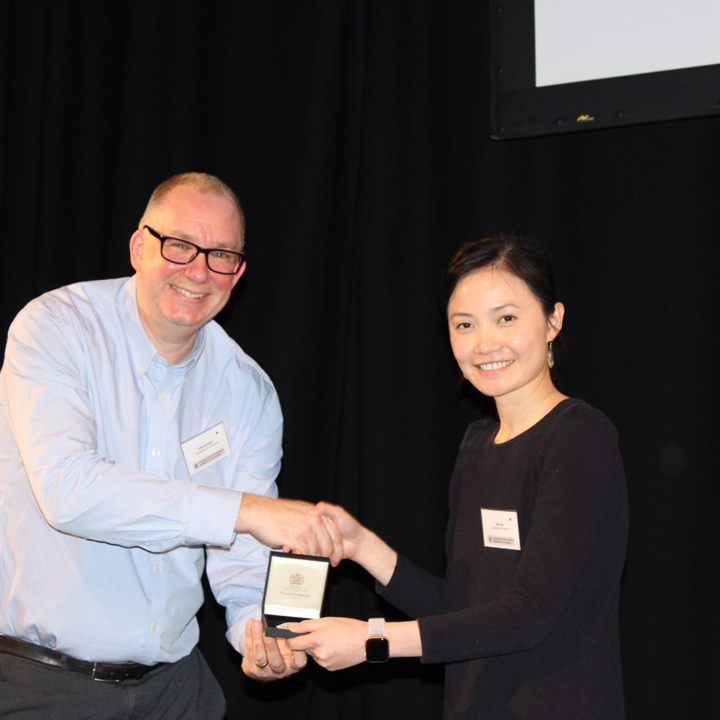
The 2019 Early Career Research Award for Signalling was presented to Qian Wu from the University of Cambridge, UK. Qian’s research focuses on understanding the functional mechanism of human DNA damage response and repair signalling network and identifying potential targets for future drug discovery. By combining different methods, her research explores three major properties of this complicated signalling network: 1. Spatial architecture of individual and protein complexes; 2. Temporal arrangement of these protein complexes; 3. Regulation of protein-protein interaction through post-translational modification. She has made significant contribution to the field by characterizing the structure, function and assembly of various key protein complexes in human Non-Homologous End Joining (NHEJ) pathway for repairing DNA double-strand breaks, which is the most toxic DNA damage types in our cells.
Read Qian's article published in Biochemical Society Transactions - Structural mechanism of DNA-end synapsis in the non-homologous end joining pathway for repairing double-strand breaks: bridge over troubled ends.
Of winning the Early Career Research Award for Signalling, Qian said: “I was absolutely thrilled and extremely happy when I found out that I got this award! It is a great honour as an early career researcher to have my research recognized by the award committee. I can’t achieve this without the strong support from my mentor Professor Tom Blundell since my Ph.D and all these wonderful colleagues in the Department of Biochemistry, University of Cambridge. More excitingly, I am really looking forward to take the encouragement from this award to initiate my own independent research in the Astbury Centre for Structural and Molecular Biology, University of Leeds.”
Qian presented her Award lecture at the joint Biochemical Society, British Pharmacology Society and The Physiological Society conference ‘Life Sciences 2019: Post-Translational Modifications and Cell Signalling‘ on 17-18 March 2019 at the East Midlands Conference Centre.
Wojciech Galej
Wojciech Galej
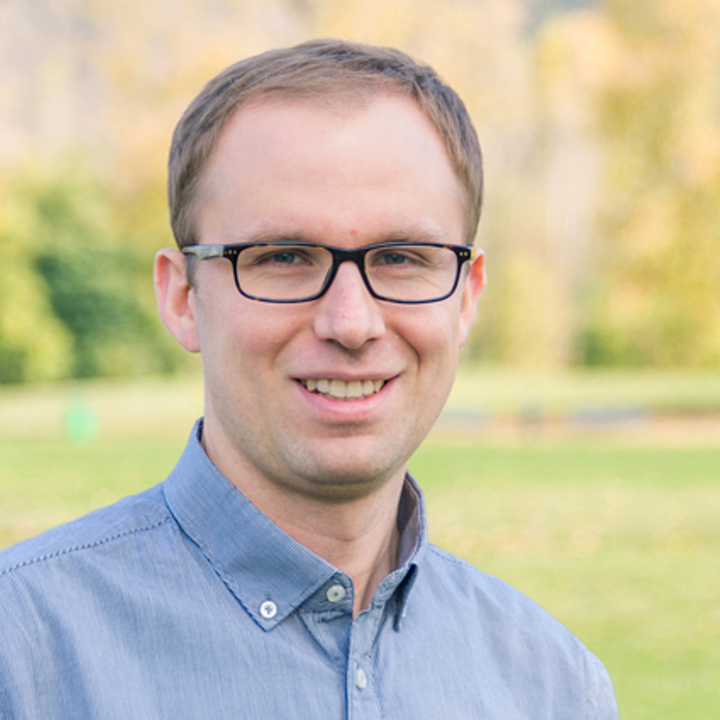
The 2018 Early Career Research Award for Molecular Structure and Function was awarded to Wojciech Galej from the European Molecular Biology Laboratory, France. Wojciech has made outstanding contributions to the understanding of the molecular mechanism of pre-mRNA splicing through his structural analysis of the spliceosome and its component using X-ray crystallography and cryo-electron microscopy. He determined the crystal structure of the Prp8 protein, the largest and most conserved protein in the spliceosome. This protein plays crucial roles in organising the RNA catalytic core of the spliceosome and its structure also provided important insight into the evolutionary origin of the spliceosome. Wojciech played a key role in the structure determination of the fully assembled, 44-subunit catalytic spliceosome using single particle cryo-electron microscopy.
Read Wojciech's article published in Biochemical Society Transactions - Structural studies of the spliceosome: past, present and future perspectives.
Of winning the Early Career Research Award for Molecular Structure and Function, Wojciech said “I am absolutely thrilled and honoured to receive this award. What makes me particularly happy is that my research was recognized and appreciated by the Award Committee. I am very grateful to my PhD advisor and a long-time mentor Dr. Kiyoshi Nagai and all my colleagues at the MRC Laboratory of Molecular Biology for their continuing support.”
Yasin Dagdas
Yasin Dagdas
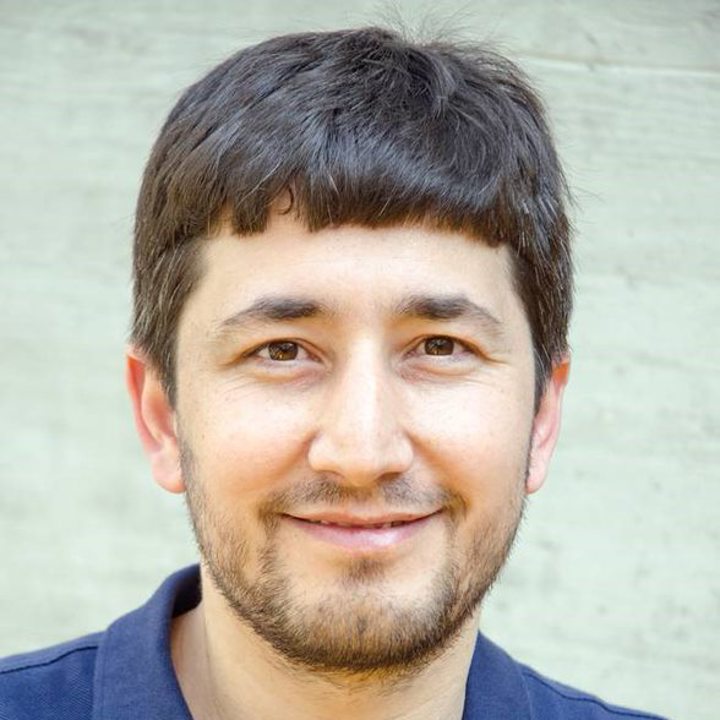
The 2018 Early Career Research Award for Cells was awarded to Yasin Dagdas from the Gregor Mendel Institute-Vienna. His work on perturbation of selective autophagy by the Irish potato famine pathogen provided crucial insights on selective autophagy in plants. At the Gregor Mendel Institute, he is combining evolutionary analyses with mechanistic tools to dissect selective autophagy at a cell type specific resolution.
Of winning the Early Career Research Award in Cells, Yasin said “I am a very pleased, honoured and humbled to receive this award. I owe this award to my amazing mentors Sophien Kamoun and Nick Talbot and to the colleagues in their labs. I also would like to thank the Gatsby Charitable Foundation and the Halpin Trust for supporting my research at The Sainsbury Laboratory and University of Exeter, respectively.”
Yasin presented his award lecture at the 83rd Harden Conference: ‘Autophagy – from molecules to disease II’ on 3-6 June 2018 at Chesford Grange, Warwickshire, UK.
Alexander Büll
Alexander Büll

The 2017 Early Career Research Award for Biotechnology was awarded to Alexander Buell (University of Düsseldorf, Germany). Alexander has made ground-breaking contributions to the application of biophysical techniques to characterize the properties of biological molecules. In particular, he has participated in seminal advances in understanding of the molecular mechanisms of aggregation of amyloid forming proteins related to Alzheimer’s and Parkinson’s disease.
Read Alexander's review article published in the Biochemical Journal - The growth of amyloid fibrils: rates and mechanisms.
Edward Chouchani
Edward Chouchani

Thi (Kelly) Nguyen
Thi (Kelly) Nguyen

Maria Romina Girotti
Maria Romina Girotti

Anne-Marie Krachler
Anne-Marie Krachler

The 2016 Early Career Research Award for Biological Systems was presented to Anne-Marie Krachler of the University of Birmingham. Anne-Marie is an outstanding young researcher who has a passion for discovery, a determination to provide robust, ground-breaking data and an unquenchable enthusiasm to train the next generation scientists demonstrated through her pioneering the “IMI Summer School”, a week-long training scheme for sixth formers that has received overwhelming acclaim and is now heavily oversubscribed.
Anne-Marie presented her Early Career Research Award lecture at the University of Birmingham, UK on 28 April 2016.
Read Anne-Marie's article published in Biochemical Society Transactions - Against the tide: the role of bacterial adhesion in host colonization.
Bungo Akiyoshi
Bungo Akiyoshi

The 2016 Early Career Research Award for Cells was presented to Bungo Akiyoshi of the University of Oxford. As well as elucidating mechanisms with clear relevance to cancer and organismal homeostasis, Bungo employs trypanosomes as a model system, and his identification of a novel, trypanosome-specific apparatus of chromosome segregation will allow the future development of drugs that may combat parasitic diseases such as African trypanosomiasis (sleeping sickness) in humans, or leishmanaiasis and nagana in livestock animals.
Bungo Akiyoshi was presented with his Early Career Research Award at the Cilia, Cytoskeleton and Cancer on 25-26 April 2016 at IGMM, Edinburgh, UK.
Read Bungo's article published in Biochemical Society Transactions - The unconventional kinetoplastid kinetochore: from discovery toward functional understanding.
Joseph Marsh
Joseph Marsh

The 2016 Early Career Research Award for Computational Biology was presented to Joseph Marsh of MRC HGU, University of Edinburgh for his work in producing an outstanding body of research, addressing diverse aspects of protein structure, dynamics, assembly and evolution using a variety of computational methods, often in combination with experimental data.
Joseph presented his award lecture at the Sanger Institute, Hinxton, UK on 8 November 2016.
Read Joseph's article published in Biochemical Society Transactions - Signalling assemblies: the odds of symmetry.
Anthony Roberts
Anthony Roberts

The 2016 Early Career Research Award for Molecular Structure and Function was presented to Anthony Roberts of Birkbeck, University of London for his work in producing research of the highest international standard focused on the structure and mechanism of cellular motor proteins.
Read Anthony's article published in Biochemical Society Transactions - Emerging mechanisms of dynein transport in the cytoplasm versus the cilium.
Paul Elliot
Paul Elliot

Patricia Muller
Patricia Muller

Rozbeh Baradaran
Rozbeh Baradaran

Glyn Hemsworth
Glyn Hemsworth

Melina Schuh
Melina Schuh

John Burke
John Burke

Joe Yeeles
Joe Yeeles

Alison Parkin
Alison Parkin

Kristopher Clark
Kristopher Clark

Tracey Gloster
Tracey Gloster

Sovan Sarkar
Sovan Sarkar

Sander van Kasteren
Sander van Kasteren

Vidya Chandran
Vidya Chandran

Alena Krejci
Alena Krejci

Taufiq Rahman
Taufiq Rahman

M Madan Babu
M Madan Babu

Rene Frank
Rene Frank

Jeremy Carlton
Jeremy Carlton

Araxi Urrutia
Araxi Urrutia

Paul Curnow
Paul Curnow

David Komander
David Komander





